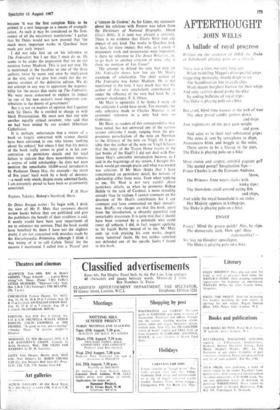Sir Denis Brogan writes: To begin with, I think the
view of Mr P. Muir that reviewers should review books before they are published and give the publishers the benefit of their erudition is odd. It surely would have been very impertinent of me to volunteer my services. That the book would have benefited by them I have not the slightest doubt. I am not concerned with mistakes made by the Encyclopaedia Britannica, although I think it was wrong of it to call Calvin 'Swiss' for the reasons I mentioned. I called him a Picard' and seitoyen Gene*: As for Lister, my statement Itioart his relations with Pasteur was taken from the Dictionary of National Biography. About Eliors Bible, it is (and was always) a curiosity. There is no evidence that Eliors Bible had any impact of any kind. The works in Quechua had, in fact, far more impact. But why, as I asked, if missionary work and missionaries were important, is there no reference to The Jesuit Relations, or, to go back to another criticism of mine, SO-iy is there no mention of Las Casas?
-
The attempt to defend the -very bad note on The Federalist shows how low are Mr Muir's standards of scholarship. The chief author of The Federalist was James Madison. He is not mentioned in the note. I very much fear that the author of this very unscholarly contribution is under the influence of the very bad book by an eminent shopkeeper, F. S. Oliver.
Mr Muir is optimistic if he thinks I made all the criticisms I could have made. For example. the only reference made to Charles Maurras is an erroneous reference in a very bad note on Gobineau.
Mr Muir, as readers of this correspondence may have noted, has not answered any of the various serious criticisms I made, ranging from the pre- posterous parochialism of the note on Newman to the illiteracy of the note on Virgil. (Is it pos- sible that the author of the note on Virgil believes that the story of the Trojan Horse occurs in the last books of the Iliad?) I did not deal with Pro- fessor Hayes admirable introduction because, as I said in the beginnings of my review, I thought this book would get enough praise and what was needed was criticism. If Mr Muir thinks that I have concentrated on pernickety detail, his notions of scholarship differ from mine. Even when replying to me, Mr Muir is not very careful about pernickety details, as when he promotes Bishop Hefele to the rank of Cardinal, a more revealing mistake than he realises. I cannot comment on the devotion of Mr Muir's contributors but I can comment and have commented on their slovenli- ness. Briefly, my charges are that this book, apart from the introduction, is absurdly parochial and remarkably inaccurate. It is quite true that it should have been reviewed by a polymath who could cover all subjects. I did, in fact, suggest applying to Sir Isaiah Berlin instead of to me. Mr Muir ends up with praising his own works, despite many 'admitted' faults. He has neither admitted nor defended any of the specific faults I found in this book.






























 Previous page
Previous page